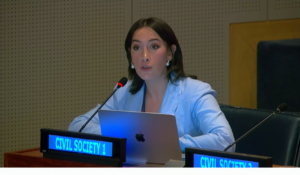On March 19, 2025, Human Rights Now’s UN youth representative Larissa Truchan made an intervention at the “High-level interactive dialogue: Accelerating implementation of the Beijing Platform for Action: the role of the Commission on the Status of Women” held at the United Nations Headquarters in New York City.
The recording is available on UN Web TV.
The transcript of the intervention is as follows.
___________________________________________
Thirty years ago, the founder of Human Rights Now, Kazuko Ito, participated in the formulation of the Beijing Declaration and Platform for Action in 1995, representing Japan’s leading bar association. Though I was not yet born, as Human Rights Now’s Youth Representative attending my first CSW, it is now my responsibility to ensure that CSW can be used as an entry point to accelerate implementation of the Beijing Platform for Action.
One particular gap in the implementation of the Beijing Declaration that Human Rights Now would like to highlight is the ongoing issue of gender-based violence.
Human Rights Now recommends the following:
- The Commission on the Status of Women must include Special Procedures and Treaty Bodies, particularly those related to monitoring discrimination and violence against women and girls, as crucial decision-makers in CSW processes. These independent experts deserve more than a 5-minute presentation to the plenary—they are some of the most qualified specialists on women’s rights policy in the world, and we must make use of their unbiased expertise and recommendations.
- The Commission on the Status of Women should ensure that the visas of Special Procedures are approved. It is abhorrent that the current Special Rapporteur on Violence Against Women, Ms. Reem Alsalem, was barred from attending CSW69 due to her visa being rejected. How could we let this happen? This recommendation also extends to civil society as a whole — to include the broadest and most diverse feminist voices in CSW processes, especially feminist voices from the Global South, CSW should better facilitate visa approval, or consider hosting CSW in a country with less visa restrictions.
- The Commission on the Status of Women should aim to facilitate the creation of international women’s rights legislation to fill gaps that currently exist. In particular, CSW should serve as a place for Member States to negotiate an Optional Protocol to CEDAW that codifies violence against women into international law. Further, CSW should serve as a place for Member States to ensure that gender perspectives are included in the development of treaties currently being negotiated, such as the Crimes Against Humanity Treaty, which must ensure that gender apartheid and reproductive violence are included as crimes.
- The Commission on the Status of Women should engage in country-level reporting mechanisms to assess Member States’ legal definitions of sexual crimes, particularly the crime of rape, and to celebrate reforms as well as to recommend revisions. Human Rights Now commends the Japanese government’s revision of Japan’s definition of rape on June 16, 2023, which now includes the concept of consent, but requires further revision to ensure that a victim is not expected to demonstrate their intention not to consent. CSW is not just a time to talk, let us use this space to assess domestic legislation related to protecting women and girls from violence, and to implement policy change to sex crimes laws in line with best practices established by Special Procedures and Treaty Bodies.
CSW should make these changes now, so that another young feminist does not have to make these same recommendations at CSW99.
Thank you.
____________________________________________________________




